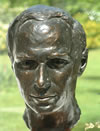
Max Nicholson
Foreword by H.R.H. the Duke of Edinburgh
originally written for Max's book "The New Envirionmental Age" , 1986 and reproduced here with permission
| Home |

Max Nicholson Foreword by H.R.H. the Duke of Edinburgh originally written for Max's book "The New Envirionmental Age" , 1986 and reproduced here with permission |